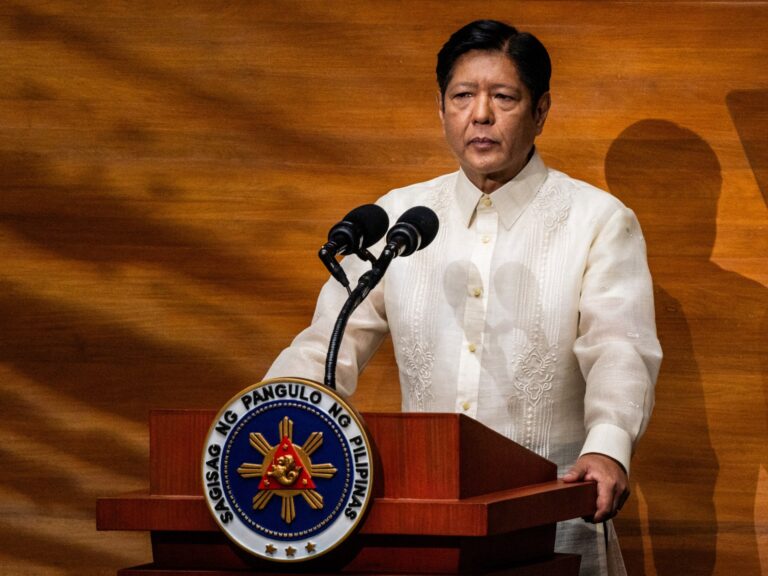The Philippine president made the remarks as Beijing and Manila announced a tentative agreement to de-escalate tensions at Second Thomas Shoal.
Philippine President Ferdinand Marcos Jr. said his country will not compromise or waver on its position on territorial disputes in the South China Sea, insisting tensions in the strategic waterway should be resolved through diplomatic channels.
President Marcos made the remarks in his annual nation-building address to Congress on Monday as the Philippines and China seek to ease tensions after a series of violent clashes in disputed waters.
Without naming China, Marcos said the Philippines would address challenges to its claims in the South China Sea, known in Manila as the West Philippine Sea, by “asserting our rights and interests in a fair and peaceful manner, as we have done in the past.”
The Philippines “will continue to find ways to reduce tensions in disputed areas without compromising our positions and principles,” he said.
“The Philippines cannot bend. The Philippines cannot waver,” he said, before receiving a standing ovation when he declared, “The West Philippine Sea is ours.”
The Philippine president’s speech came a day after Manila and Beijing announced they had reached a “tentative agreement” on resupply operations for Philippine troops stationed at Second Thomas Shoal, a disputed area in the South China Sea.
China claims almost the entire South China Sea, including Second Thomas Reef, and the Philippines has deployed rusting naval vessels there to shore up its maritime claims.
Philippine and Chinese troops have been engaged in violent clashes over the submerged reef in recent months, raising concerns that the United States could be drawn into the conflict, citing a mutual defense treaty with the Philippines.
Tentative Agreement
Neither China nor the Philippines have provided details of the interim agreement, but the Manila government said on Monday it would “not have any adverse impact on the respective national positions of the two countries.”
“Our desire to de-escalate the situation in the South China Sea and manage differences peacefully underscores that the agreement was made in good faith and that the Philippines remains ready to implement it,” the Philippine foreign department said in a statement.
“We call on China to take similar action.”
China confirmed the “interim agreement” in which the two countries agreed to jointly manage disputes over maritime issues and seek to ease tensions.
China insists its actions in the area are legal and on Monday again called on the Philippines to tow away the stranded warship and said it was unacceptable for Manila to ship large quantities of construction materials to the shallow waters.
“If between now and the time the warship is towed away, the Philippines needs to send essential supplies to the crew on board the warship, China is ready to allow it in a humanitarian spirit after the Philippines notifies China in advance and conducts on-site verification,” China’s foreign ministry said in a statement.
The Philippines has previously opposed giving advance notice to China of its resupply missions, which it maintains are legal, and said the new agreement did not change that view, despite the Chinese Defense Ministry’s statement.
“The principles and approach outlined in the agreement were reached through careful and thorough consultations between the two sides, paving the way for convergence without compromising national positions,” the Philippine Department of Foreign Affairs said in a statement.
“Therefore, the spokesperson’s statements about advance notification and on-site inspections are inaccurate,” it added.
China denies a 2016 ruling by the Permanent Court of Arbitration in The Hague that said China’s sweeping territorial claims in the South China Sea have no basis in international law. The case was filed with the tribunal by the Philippines.
Chinese Foreign Ministry spokesman Mao Ning said the tentative arrangement with the Philippines on transporting humanitarian aid “reflects China’s goodwill.”

